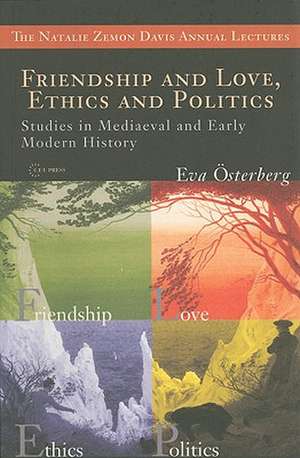Friendship and Love, Ethics and Politics: Studies in Mediaeval and Early Modern History: Natalie Zemon Davies Annual Lectures
Autor Eva Osterbergen Limba Engleză Paperback – 29 dec 2009
Preț: 121.36 lei
Preț vechi: 162.45 lei
-25% Nou
Puncte Express: 182
Preț estimativ în valută:
23.23€ • 24.16$ • 19.17£
23.23€ • 24.16$ • 19.17£
Carte indisponibilă temporar
Doresc să fiu notificat când acest titlu va fi disponibil:
Se trimite...
Preluare comenzi: 021 569.72.76
Specificații
ISBN-13: 9789639776609
ISBN-10: 9639776602
Pagini: 229
Dimensiuni: 130 x 196 x 20 mm
Greutate: 0.34 kg
Editura: Central European University Press
Seria Natalie Zemon Davies Annual Lectures
ISBN-10: 9639776602
Pagini: 229
Dimensiuni: 130 x 196 x 20 mm
Greutate: 0.34 kg
Editura: Central European University Press
Seria Natalie Zemon Davies Annual Lectures
Notă biografică
Eva Österberg is Professor of History at Lund University, Sweden.
Descriere
What happened to the classical ideas of close relations when they were transmitted to philosophers, clerical and monastic thinkers, state officials or other people in the medieval and early modern period? To what extent did friendship transcend the distinctions between private and public that then existed? This book addresses these questions.






